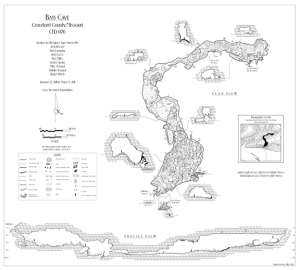Biology
Hoffman Institute members attend National Speleological Society meeting
- Friday, August 31st, 2012
Members of the WKU Geography and Geology Department’s Hoffman Environmental Research Institute attended the National Speleological Society (NSS) Annual Convention this summer in Lewisburg, W.Va.

Environmental Research Specialist Ben Miller received a cave cartography award for his map of Bass Cave in Missouri.
The convention, held annually, gathers cavers, karst scientists, educators, National Park Service employees, and land managers, among others, to share knowledge and research about significant topics affecting caves and karst environments, such as groundwater issues and White Nose Syndrome’s impact on bats around the country. The NSS is the largest nonprofit organization in the world that deals with caves and karst landscapes, having more than 10,000 members.
Four Hoffman Institute faculty, staff and students participated in the conference, including graduate students Gilman Ouellette of Hawley, Pa., and Sarah Arpin of Bowling Green, affiliate staff member Pat Kambesis, and faculty member Dr. Jason Polk. Collectively, they gave five presentations during the weeklong event in sessions whose topics included geology and geography, cave and karst management, U.S. exploration, and international exploration, among others. Several alumni members of the Green River Grotto, a WKU student organization for caving and karst studies, also attended the event, including Josh Brewer and Sam Kramer.
Environmental Research Specialist Ben Miller was awarded a NSS Merit Award for Cave Cartography for his map of Bass Cave in Crawford County, Mo. Many of the students within the Hoffman Institute and Department of Geography and Geology have visited the Missouri Ozarks area to study caves and karst features.
Ouellette, who attended his first NSS Convention, is completing a thesis on climate change reconstruction in the Caribbean using cave deposits. “This was a great learning experience to interact with some of the most notable karst scientists in the country, as well as gain feedback on my thesis project and discuss current events in my field with my colleagues,” he said.
Dr. Polk noted: “This was a great experience for our staff and students, and we are proud to have been able to contribute and share our recent efforts in research and outreach to our colleagues who study caves and karst landscapes.”
Contact: Jason Polk, (270) 745-5015.
Some of the links on this page may require additional software to view.

